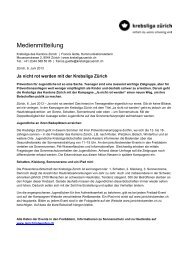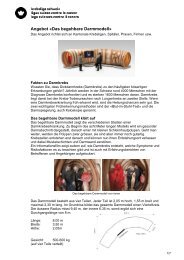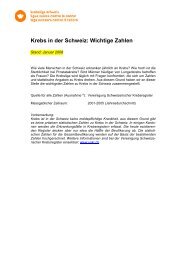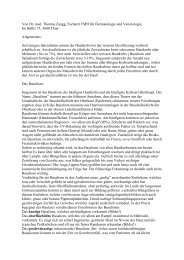Cancer Research in Switzerland - Krebsliga Schweiz
Cancer Research in Switzerland - Krebsliga Schweiz
Cancer Research in Switzerland - Krebsliga Schweiz
Create successful ePaper yourself
Turn your PDF publications into a flip-book with our unique Google optimized e-Paper software.
136<br />
slides <strong>in</strong> two different concentrations. After <strong>in</strong>cubation of<br />
samples, bound antibodies were detected via a fluorescence<br />
signal. Data were preprocessed and statistically analyzed.<br />
Us<strong>in</strong>g this array technology, we were able to identify a<br />
panel of blood antibodies with different levels <strong>in</strong> healthy<br />
controls compared to SOC. Two antibodies had an identical<br />
core structure, which had significantly lower antibody<br />
levels <strong>in</strong> patients with SOC. The comb<strong>in</strong>ation of five antibodies<br />
reached significance for the detection of SOC with<br />
an excellent discrim<strong>in</strong>ation capability.<br />
Our data <strong>in</strong>dicate that us<strong>in</strong>g pr<strong>in</strong>ted glycan array technology<br />
we are able to recognize the transformation of a cancer<br />
via its abnormal carbohydrate b<strong>in</strong>d<strong>in</strong>g, hereby measur<strong>in</strong>g<br />
an <strong>in</strong>dividual person’s immune response. With this<br />
technology we are able to def<strong>in</strong>e an <strong>in</strong>dividual profile<br />
for patients with SOC. Further experiments are ongo<strong>in</strong>g<br />
to validate these results <strong>in</strong> a double-bl<strong>in</strong>d manner for a<br />
bigger <strong>in</strong>dependent patient cohort.<br />
Project coord<strong>in</strong>ator<br />
Dr. Viola He<strong>in</strong>zelmann-Schwarz<br />
Translational <strong>Research</strong> Group<br />
Kl<strong>in</strong>ik für Gynäkologie<br />
Mediz<strong>in</strong>bereich Frau-K<strong>in</strong>d<br />
UniversitätsSpital Zürich<br />
Frauenkl<strong>in</strong>ikstrasse 10<br />
CH-8091 Zürich<br />
Phone +41 (0)44 255 5374<br />
Fax +41 (0)44 255 4553<br />
viola.he<strong>in</strong>zelmann@usz.ch<br />
Herrmann Richard | The SAKK Initiative for regional<br />
hospitals (KLS 02067-04-2007)<br />
The SAKK <strong>in</strong>itiative for regional hospitals aimed to provide<br />
strategic, operational and f<strong>in</strong>ancial support to middlesized<br />
regional hospitals to give patients with cancer liv<strong>in</strong>g<br />
<strong>in</strong> peripheral areas the opportunity to be treated with<strong>in</strong> a<br />
cl<strong>in</strong>ical trial.<br />
The Swiss Group for Cl<strong>in</strong>ical <strong>Cancer</strong> <strong>Research</strong> (SAKK) has<br />
conducted cl<strong>in</strong>ical trials <strong>in</strong> oncology s<strong>in</strong>ce 1965. Today,<br />
thanks to medical progress <strong>in</strong> general and cl<strong>in</strong>ical research<br />
<strong>in</strong> particular, many cancer types are detected at early<br />
stages and will be successfully cured. Hence, the number<br />
of patients with cancer requir<strong>in</strong>g therapeutic <strong>in</strong>tervention<br />
has <strong>in</strong>creased rapidly. As a consequence, most hospitals<br />
have expanded their <strong>in</strong>frastructure and personnel qualifications<br />
to ensure adequate treatment of patients with<br />
cancer. But not all hospitals offer cl<strong>in</strong>ical trials, s<strong>in</strong>ce cl<strong>in</strong>ical<br />
research is very expensive and <strong>in</strong>creas<strong>in</strong>g adm<strong>in</strong>istrative<br />
and regulatory requirements impede the conduct of<br />
cl<strong>in</strong>ical trials. In <strong>Switzerland</strong> research-related structures <strong>in</strong><br />
the cl<strong>in</strong>ical sett<strong>in</strong>g exist ma<strong>in</strong>ly at the university hospitals<br />
and the larger cantonal hospitals, whereas regional hospitals<br />
are mostly oriented towards service provision and not<br />
research. In general, patients with early stage cancer are<br />
treated at regional hospitals, whereas patients with an ad-<br />
vanced stage or rare disease that requires <strong>in</strong>tensive treatment<br />
are commonly treated at a university hospital or large<br />
cantonal hospital, where the patients also have access to<br />
cl<strong>in</strong>ical trials. The risk of this practice is that cl<strong>in</strong>ical trial results<br />
may not present a real-world view of how these treatments<br />
and drugs actually work <strong>in</strong> patients’ populations.<br />
Regional hospitals can offer a much more realistic picture<br />
of the efficacy and safety of a treatment or drug. This potential<br />
bias might be reduced by offer<strong>in</strong>g patients the possibility<br />
to access cl<strong>in</strong>ical trials at their regional hospitals.<br />
To enforce cl<strong>in</strong>ical cancer research at regional hospitals,<br />
SAKK <strong>in</strong>itiated the “middle-sized hospitals” project. Eight<br />
hospitals met the requirements of the <strong>in</strong>itiative (Spitalzentrum<br />
Biel, Hôpital fribourgeois, Kantonsspital Graubünden,<br />
Kl<strong>in</strong>ik Hirslanden Zürich, Kantonsspital Luzern, Stadtspital<br />
Triemli, Centre hospitalier du centre du Valais, Kantonsspital<br />
W<strong>in</strong>terthur) and received strategic, operational and f<strong>in</strong>ancial<br />
support to set-up the required structures to perform<br />
cl<strong>in</strong>ical cancer research. The hospitals <strong>in</strong>vested grant<br />
money to hire a data manager who supports the medical<br />
staff <strong>in</strong> all adm<strong>in</strong>istrative and coord<strong>in</strong>ative aspects of a<br />
cl<strong>in</strong>ical trial.<br />
The funded hospitals all started to participate <strong>in</strong> SAKK<br />
trials shortly after project start, and their activities have<br />
<strong>in</strong>creased markedly over the last three years. In 2010 the<br />
eight hospitals recruited 242 patients <strong>in</strong>to cl<strong>in</strong>ical trials<br />
coord<strong>in</strong>ated by SAKK out of a total of 787 patients.<br />
Cl<strong>in</strong>ical cancer research performed by SAKK cares about<br />
the <strong>in</strong>terest of the patients and addresses research questions<br />
related to practical work. In addition, cancer treatment<br />
with<strong>in</strong> a cl<strong>in</strong>ical trial complies with medical treatment<br />
guidel<strong>in</strong>es and is a quality measurement. As a direct<br />
result of the SAKK <strong>in</strong>itiative, more cancer patients have<br />
access to cl<strong>in</strong>ical trials and thereby to treatment of a high<br />
quality standard. Importantly, patients have the possibility<br />
to stay at their regional hospitals, where they are<br />
treated by their local oncologists and rema<strong>in</strong> with<strong>in</strong> their<br />
social environments.<br />
Project coord<strong>in</strong>ator<br />
Prof. Dr. Richard Herrmann, Basel<br />
Correspondence:<br />
Annik Ste<strong>in</strong>er<br />
Head Partner Relations<br />
SAKK-Koord<strong>in</strong>ationszentrum<br />
Eff<strong>in</strong>gerstrasse 40<br />
CH-3008 Bern<br />
Phone +41 (0)31 389 93 96<br />
Fax +41 (0)31 389 92 00<br />
annik.ste<strong>in</strong>er@sakk.ch

















